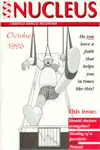Despite all that, I've thoroughly enjoyed my year. I've also enjoyed more medicine, done more new things and learned more about myself than ever before. It has convinced me that I am right to be in medicine.
It is with these conflicting memories in mind that I write a few suggestions here in the hope that they will help smooth out some of the rough patches and increase the fun of house jobs.
Relationships with staff
The temptation to gossip has been one of the most persistent and easiest to give in to that I have faced to date; house officers talk with each other about their bosses, talk to nurses about their colleagues and talk to each other about their patients. It is so easy to be critical in the absence of the person involved. The team atmosphere is damaged; everyone knows that they have been talked about because they themselves have talked about everyone else. Constructive criticism is made almost impossible.
As Christians, we should not take part in gossip. If we have a problem with someone we should take it to them first. This will foster trust between doctors and nurses and will be a surprisingly distinctive mark for the Christian. Personally, I decided that I would just have to opt out of any conversation which involved gossiping about other people. I was later surprised by a non-Christian colleague wishing to confide in me about some personal difficulties; presumably, he considered me trustworthy and knew that what he told me would go no further.
If gossip was the hardest temptation, then arrogance came a close second. Doctors are used to being in charge and so it sometimes comes naturally to be rude and abrupt on the phone. Yes, we are often busy but we have to remember that other people have their jobs to do too.
Perhaps the biggest problem with arrogance is the way it divides doctors and nurses. The relationship is already made difficult by the parallel authority structures - staff nurse to sister and house officer to consultant. Who is in charge is not made clear. Nurses can feel that the ward is 'theirs' and that we are treating 'their' patients. They act as the patients' advocates to us. I have found it helpful to try and work with these unspoken assumptions, rather than to take the arrogant approach and demand my own way.
Particularly during my second house job, I feel that my better understanding of the way nurse-doctor interactions operate led to my relationship with the nurses being improved. We were able to develop a pre-op clerking clinic involving both nurses and house officers; this helped both parties as well as the patients.
Relationship with God
Apparently, a large number of Christian medics fall away from their faith during house jobs. I certainly found the going more difficult and concluded that the difficulties came because of a lack of 'practice' of being a Christian; it is easy, for example, to let quiet times and Bible reading slip. Standards fall and church attendance becomes infrequent or stops. Of course, these activities do not make us Christians but they are integral parts of a healthy relationship with God.
Tiredness is a real problem and so quiet times are sometimes the first activity to go when the alternative is a lie-in. Only discipline and a love for God can overcome this.
I met with a friend from church for breakfast once a week, during which time we would discuss how the practice of our Christian lives was going. We made each other accountable when there were difficulties and temptations to be overcome and we also had brilliant times of prayer together which were great sources of encouragement and strength.
Publications like 'The Doctor's Life Support' from CMF are helpful as they fit in your white coat pocket but do not replace reading the Bible. I carried mine around to use when I was on call.
Perhaps the best human source of strength has been my church. I think that it is essential to quickly find a good church which you can be committed and accountable to as well as encouraged by. I chose house jobs in hospitals which were near enough to my pre-qualification church to allow me to remain in attendance there. Naturally, this is not always possible; still, a nearby church should be quickly found. Find people who will pray with and for you; and give you Christian friendships outside of medicine.
Conclusions
It is vital that you examine yourself (both character and soul) while you are a house officer. Assess your relationships with the staff. Do they trust you? Do they respect you?
Assess your relationship with God. Has it grown cold? Does anyone at work know you are a Christian?
Be honest about yourself and get friends to help you recognise and change your bad bits.
The most difficult times came when I was tired. It is important to have secure foundations- both spiritual and professional- for when the difficult days and nights come. God has been a most secure foundation to me all through my house jobs and I commend him to you to be your strength too.
'Cling tightly to your faith in Christ and always keep your conscience clear, doing what you know is right.' (1 Tim 1:19, LB)
































